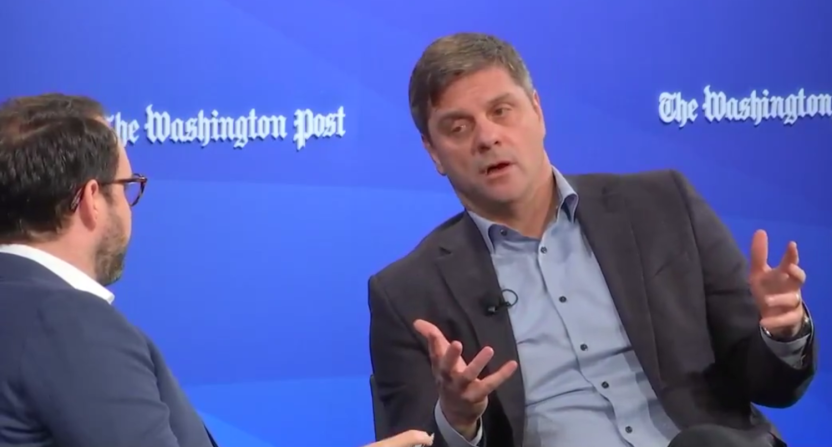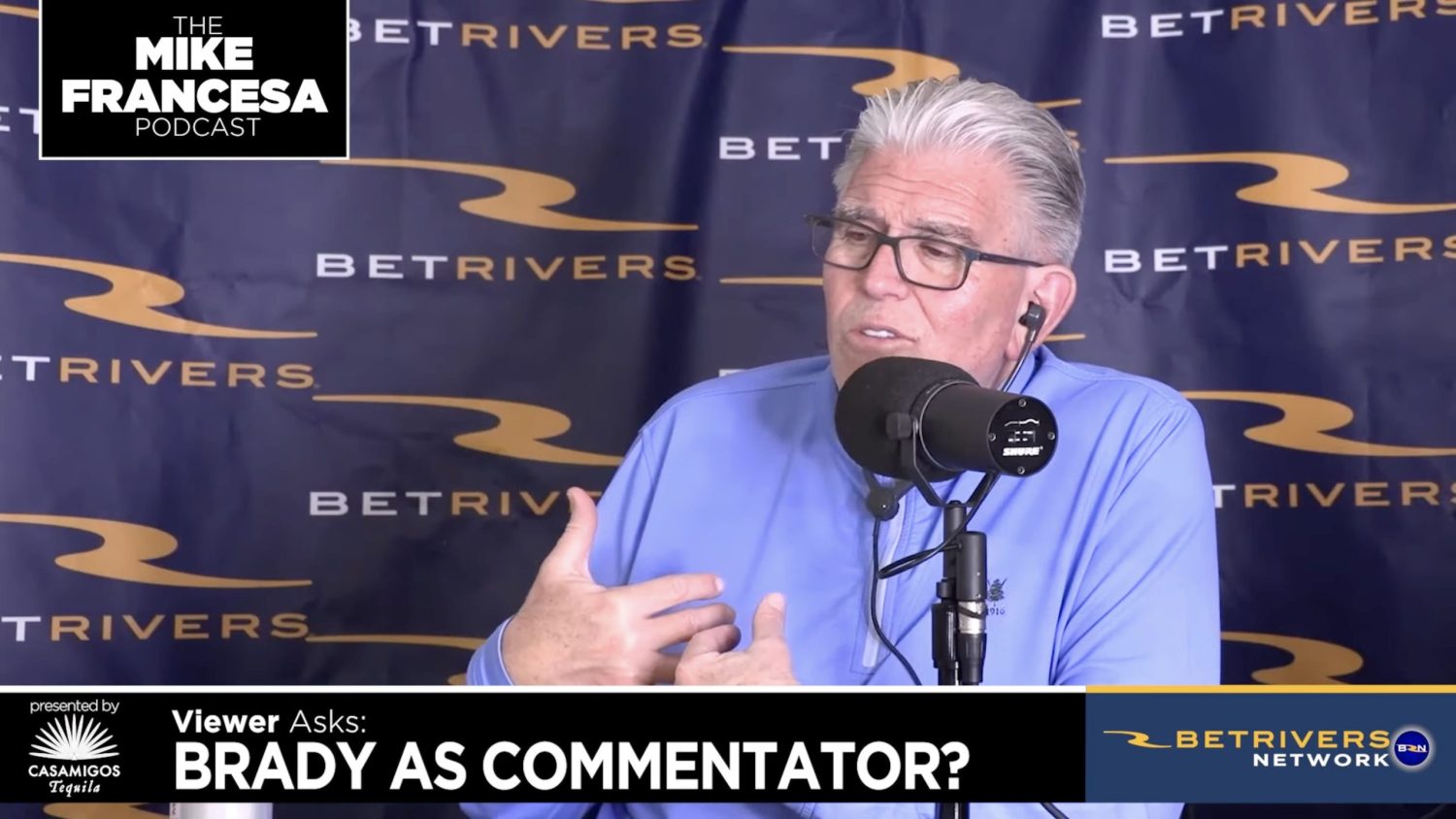There’s been a lot of drama around the announced joint streaming venture from ESPN, Fox, and Warner Bros. Discovery that’s set to launch this fall, despite that not yet having a firm price tag or even a name.
“Cartel” complaints about it and even a lawsuit from virtual multichannel video programming distributor Fubo are somewhat expected, as the venture does seem likely to drain off at least some MVPD (cable, satellite, or virtual) customers (despite claims from execs like Fox CEO Lachlan Murdoch that they’re targeting those without MVPD packages). But more curious opposition has come from the NFL.
Some of the NFL opposition appears to come from not being in the loop early on. Last month, John Ourand of Puck detailed that NFL execs felt “blindsided” by this. That feeling was because they were deep in talks with ESPN about taking an equity stake in that company and combining NFL Media operations with it. Still, ESPN chair Jimmy Pitaro only provided commissioner Roger Goodell and chief media and business officer Brian Rolapp a short heads-up before the joint venture was announced. That was the lead section of a Wall Street Journal profile of Pitaro this month by Isabella Simonetti and Robbie Whelan (also notable for its strange discussion of Pitaro and Pat McAfee), which featured the line “Goodell complained to one associate, ‘Why would Disney treat a partner this way?'” (and an NFL spokesperson denying Goodell said that).
But beyond that, it’s not clear why the NFL is so critical of this. The league has proven eager to pursue streaming, from making the full Thursday Night Football package exclusive to Amazon’s Prime Video beginning in 2022 through ESPN+ exclusive regular-season games through Peacock-exclusive regular-season and playoff games this past season and an Amazon-exclusive playoff game this coming season. They also work with broadcasters CBS and NBC (and to a lesser degree, ESPN) that carry their NFL coverage in their direct-to-consumer streaming apps.
The league has also launched its own NFL+ over-the-top app, which offers in-market and primetime games (albeit only on phones and tablets) and more. So their general approach has seen them quite interested in making games available to consumers outside of MVPD bundles. And this joint venture would seemingly offer another way into that, and it would include ESPN, the only NFL partner not currently available either over-the-air or direct-to-consumer outside a bundle (ESPN has ESPN+, and that has some, but not all, of its NFL games; the full ESPN direct-to-consumer service is expected to launch in 2025). And it includes Fox, which is available over the air but, unlike NBC and CBS, doesn’t offer its linear channel in a DTC package, so it’s also been a sticking point for cord-cutters.
But, at The Washington Post‘s Live Futurist Summit Thursday, Rolapp was critical of the joint venture in a conversation with Post sports media reporter Ben Strauss. And he even made an unusual claim that vMVPD bundles with YouTube TV would be a better deal for NFL fans:
.@brianrolapp on Disney, Fox and Warner Bros. Discovery sports bundle: “I don’t think it affects anything we do. There positioning it as the ultimate sports bundle but it’s missing more than half of NFL football…. I’m a bit confused personally by the value proposition.” pic.twitter.com/ZbsxuwD0z6
— Washington Post Live (@PostLive) March 21, 2024
“We were a little surprised by it. The presses love to talk about how surprised we were, we were a bit surprised. But I don’t think it affects anything we do. For us, it’s interesting: they’re positioning it as the ultimate sports bundle but it’s missing more than half of NFL football, which, as we just got done saying, is 93 of the top 100 telecasts. I’m not sure, I don’t understand how a sports fan’s going to look at that and say that’s a better value when I could spend $20 more a month and buy YouTube TV and have all of the NFL and then actually have access to Sunday Ticket, which is our out-of-market package on Sunday afternoons.
“So I’m a bit confused personally by the value proposition. They clearly see something that maybe we don’t at the time. But I do know our partners, which we do like, are leaning in and trying to figure out this new world. And you can’t say that’s not a bold step. It certainly is, and will probably have ramifications a bit for the pay-TV world. But we’ll have to see how it plays out.”
Arguments about value come up all the time with bundles versus streaming, and they’re highly dependent on the specific grouping of channels an individual wants. Generally, if someone wants a lot of different linear channels and doesn’t really care about streaming-exclusive content on the likes of Paramount+ or Peacock, a bundle may be cheaper for them. In contrast, if someone cares more about a few linear channels and streaming-exclusive content, several DTC subscriptions may be a better fit than a bundle. But there are numerous permutations of that depending on the specific things the individual wants, and it’s usually difficult to clearly state one approach is better. The NFL, however, maybe the sports entity worst equipped to argue for a traditional bundle.
To start with, the vast majority of NFL games are broadcast over the air on CBS, Fox, NBC, and ABC. (ABC carried more Monday Night Football than usual this past season due to the writers’ strike and annoying MVPDs; it’s unclear just how much they’ll have this season and going forward, but they do have a notable role under the current TV deals, including the Super Bowl in 2027 and 2031.) Over-the-air games are available via digital antennas; there’s a wide range of prices and features there, but they generally start around $10.
And broadcast networks still have a much higher reach than cable, and part of that is with antennas. Nielsen recently estimated that around 22.75 million of the 125 million U.S. TV households for the 2023-24 TV season access over-the-air programming with an antenna. Meanwhile, linear ESPN was recently estimated at having around 71 million households, down from a peak of 100 million in 2011. So there’s a big gap between “households with ESPN” and “TV households,” and the joint venture (which doesn’t have full pricing details yet but is estimated at likely being $45-50 a month) will be the first and cheapest way to access ESPN outside of a bundle (a long-awaited goal for many), at least until ESPN’s own DTC service rolls out in the fall of 2025. (One distinction: the MNF games on ESPN are available on NFL+, cheaper at $7 a month, but live games there are only available on phones and tablets, not TVs, without a workaround.)
Yes, some people either can’t or don’t want to use an antenna for over-the-air content, instead getting it through MVPDs or DTC services. And that’s absolutely fine. But even from that approach, YouTube TV is not really a better value for the NFL alone.
YouTube TV is $73 a month these days. If the joint venture comes in at $50 a month, the upper end of what’s been discussed so far (and $23 less than YouTubeTV, not the $20 Rolapp cited here), viewers looking for all of the NFL would need to add Peacock Premium ($12 a month) to get NBC access, and basic Paramount+ ($6 a month) for NFL on CBS access (only the $12 a month Paramount+ with Showtime includes full local CBS access, but the basic version includes the NFL on CBS on a separate feed).
So that’s $68 a month for all of the regular, non-Sunday Ticket NFL content available through YouTube TV, and more when it comes to Peacock-exclusive games. Even if you go up to Paramount+ with Showtime (again, not necessarily just for the NFL, but it has other merits), this becomes $74 a month, very similar to YouTube TV. (Of course, Prime Video for Thursday Night Football and the exclusive playoff game are not included in either of these calculations; Amazon Prime is currently $15 a month or $140 for a year.) So there isn’t a clear “value proposition” win for YTTV on the NFL alone, contrary to Rolapp’s claim.
That does not mean the joint venture, Peacock and Paramount+, will be a better option than a bundle for all consumers. As mentioned above, those calculations really depend on the specific combination of things you want to watch. (And for those who want Sunday Ticket, which is available without a YouTube TV package but cheaper with it, YouTube TV likely makes more sense.) But it’s curious to hear the case against the joint venture from the NFL, which counts two of the three companies involved here as broadcast partners and which has embraced streaming and bundle-free offerings elsewhere (although not exclusively for the Super Bowl any time soon, as Rolapp reiterated elsewhere in this conversation with Strauss).
And it’s particularly odd to hear this case when NFL content alone is calculable as a far better value with the joint venture and an antenna than YouTubeTV or a slightly better value with the joint venture, Peacock, and Paramount+. Joint venture critics such as Fubo can certainly make cases for the overall value of their bundles on fronts not including the NFL. (However, the joint venture can make its own case for its value: WBD, a third of this partnership, doesn’t carry the NFL, but has NBA, MLB, NHL, March Madness, and other sports content.) But the NFL, in particular, doesn’t have the strongest case that bundles are the way to go for its content, especially considering how much of it is broadcast over the air.
Thus, these comments from Rolapp are at the least curious about their promotion of MVPDs versus the joint venture. Now, it does make some sense that the specific MVPD he talks up is YouTubeTV, which has that Sunday Ticket deal with the NFL; more subscribers to YouTube TV may lead to more Sunday Ticket subscribers. There also is the logic of the NFL being annoyed over getting “blindsided” by the joint venture, with Rolapp admitting here they were surprised even while downplaying those reports. But they remain an unusual entity to see criticizing this idea, as the joint venture certainly looks promising for many NFL fans (and particularly for those who have long been denied the ability to buy linear ESPN outside an MVPD).
[Washington Post Live on Twitter/X]







